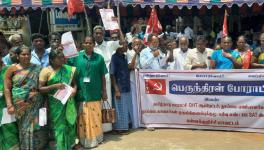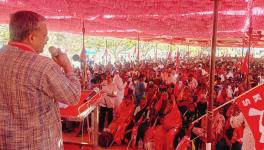Karnataka Budget: What Does It Offer to Garment and Textile Workers?
Image for representational use only.Image Courtesy : Deccan Herald
The budget presented by H D Kumaraswamy, the chief minister of Karnataka, for the fiscal year 2019-2020 seems to have given hope to the workers from the textile and garment industry of the state.
Jayaram from Garment and Textile Workers’ Union (GATWU) told Newsclick, “After 40 long years, for the first time, the state government has made an allocation for the garment and textile industry in its budget.”
The union has been in a logjam with the industries’ managements and the state government owing to their demand for increase in the minimum wages. However, it looks like the government is still not ready to intervene in the matter to break the logjam.
Also Read: Karnataka Budget: Agriculture, Education and Health
Allocation for the Sector
In the budget, the government has earmarked money for housing, skill development and compensation in case of an accident. Rs 50 crore have been allocated for rent-based housing scheme for the readymade garment workers. The government also announced a package of Rs 10 crore for childcare centres, compensation in case of accidents, while Rs 37.5 crore have been allocated for skill development, and apprentice training of the 25,000 women workers belonging to Scheduled Castes and Scheduled Tribes.
GATWU, in a statement, said, “There are around four-five lakh workers in the garment sector, and for the first time a government has recognised us as workers and made allocations in the budget.”
Representatives of GATWU, along with other unions had met the chief minister on January 29, 2019, to present their demands. They had demanded three things: housing for garment workers, transportation facilities, and scholarships for children of the garment workers. Two of these demands have found a solution in the budget.
Also Read: Karnataka Budget: People’s Demands For a Government That’s Struggling to Survive
However, the union had demanded that the state should design a scheme similar to the Employees’ Provident Fund (EPF) of Government of India, under which the employees can withdraw PF to own a house.
Jayram told Newsclick, “We do not know how the hosing scheme is designed, and how it will function. We still demand that the state government come up with a PF-based housing scheme.”
Struggle for Minimum Wage Continues
Newsclick had reported earlier that the insufficient wages plague the garment sector in the state of Karnataka. The textile workers have been fighting for minimum wage, and improvement in their working conditions. According to a government survey two years ago, there were 3.75 lakh workers and 857 factories in the state. Now, there are more than 1,000 factories and about 4-4.5 lakh workers employed with the industry. Eighty per cent of the workers in the state are women, and 45 per cent of them are from the women-headed households.
Governments, since 1979, have turned a blind eye to the garment industry. Karnataka has 76 industries with scheduled employments and none of their managements are united. But, the managements of the garment industry are all united. This makes them powerful players. They lobby with both the central and the state governments. Pratibha of GATWU said that this is also reflected in the attempt of the CM to have a dialogue with the employers to decide and increase the minimum wages of the workers.
Also Read: A Struggle for Minimum Wage
On June 12, 2018, the CM had invited the workers and managements for a meeting. In this meeting, it was decided that the union representatives will be meeting the managements on June 18, 2018. At the meeting, the CM directed the officials to set up a committee involving Labour Department officials, textile manufacturers, central trade unions, and garment workers. The committee is said to be studying the “long-pending issues” of the garment workers including the minimum wage.
According to Pratibha, nothing has changed after that meeting. The government had set up a committee; however, the managements of the 76 industries with scheduled employments in the state have approached the High Court. They have refuse to pay the agreed upon Rs, 18,000.
Other demands of the workers
The union had informed the CM that the workers from the rural areas in the garment factories spend 10-15 per cent of their wage on transportation. The union had demanded that the state government should bear 45 per cent of the cost of the transportation. However, the government has been silent on this demand, and so on the demand for scholarships for the children of the workers.
Also Read: K’taka Garment and Textile Industry Managements Pressurise the Govt to Curb increase in Wages
The union has suggested that Rs 100 be deducted from the worker’s pay, Rs. 200 from the management, and Rs. 200 from the government, in order to increase the scholarships. The union demands that the scholarship amount be increased to Rs. 5,000 for the students in standard 5th-8th; Rs. 10,000 for the students in standard 8th-10th; Rs.15,000 for pre-university and Rs. 25,000 for the graduate and postgraduate students.
The state government, as of now, pays Rs 3,000 per annum (p.a.) for the students in standard 5th-8th; Rs. 4,000 p.a. to pre-university, Diploma and ITI students; Rs. 5,000 p.a. for undergraduate students, Rs. 6,000 p.a. for postgraduate students and Rs. 10,000 for engineering students.
The students from the general category who score 50 or more percentage, and the students from the Scheduled Castes and Scheduled Tribes (SC and ST) are eligible for these scholarships.
Also Read: #WorkersStrikeBack: The Longstanding Struggle of Garment and Textile Workers in K’taka
Jayaram said that the union will wait for clarifications on the housing schemes proposed by the government in the budget, and will then push for their demands. He also pointed that the allocation from the government for child care is not necessary, as it is the management’s responsibility to do it. “Why is the government spending on something that the managements are supposed to be doing?” he asked. He further noted that it is very important that the government allocate scholarships for the children of these workers.
Get the latest reports & analysis with people's perspective on Protests, movements & deep analytical videos, discussions of the current affairs in your Telegram app. Subscribe to NewsClick's Telegram channel & get Real-Time updates on stories, as they get published on our website.
























